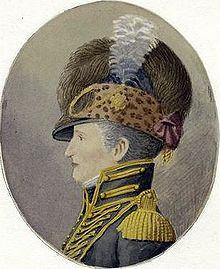 |
| Source |
European Union laws require you to give European Union visitors information about cookies used on your blog. Note: I'm not savvy enough to know about blog cookies; if there's a concern on your part, it's probably best not to visit my pages.
Showing posts with label General Hampton. Show all posts
Showing posts with label General Hampton. Show all posts
Wednesday, October 26, 2016
Tuesday, September 30, 2014
Prelude To The Battle of Châteauguay
An account of the Battle of Châteauguay: ...(published in Montreal):
Not reflecting--for he seems to have had the information--that the wood was only fifteen miles or so in depth, the Canadians few in number, and that a short press forward would have brought him into the open country of L'Acadie leading towards Montreal, the American General [Hampton] in two days withdrew along the border towards Châteauguay Four Corners, alleging the great drought of that year as a reason for wishing to descend by the River Châteauguay. At the Corners he rested his army for many days.
When Hampton moved to Four Corners, Lieut.-Colonel De Salaberry, with the Canadian Voltigeurs, moved in like manner westward to the region of the Châteauguay and English Rivers.
De Salaberry was now ordered by him [Sir George Prevost] on the Quixotic errand of attacking with about 200 Voltigeurs and some Indians the large camp of Hampton at Four Corners.
On the 1st of October he [De Salaberry] crept up with his force to the edge of the American camp. One of his Indians indiscreetly discharged his musket. The [American] camp was in alarm in an instant.
He...withdrew to Chateauguay... taking the precaution...to destroy and obstruct as much as possible in the path of the enemy.
Acquainting himself also with the ground over which Hampton was expected to make his way into the Province he [De Salaberry] finally stopped selected and took up the position where the battle afterwards took place.
Labels:
Battle of Châteauguay,
Canada,
General Hampton,
Native Americans,
Quebec,
Sir George Prevost
Thursday, September 18, 2014
The Entire Want Of Preparation
 |
| Source |
Mr. Henry Adams in his second volume of the " History of the United States" devotes two chapters to the events connected with the surrender of Detroit in 1812, in which he shows the entire want of preparation with which President and congress, under the influence of Henry Clay and others, rushed into a conflict with the veterans of England on land, and her thousand war-ships on the ocean; and the imbecility of the war
department, of its chief Dr. Eustis, and the poor organization of the small army which was scattered over an immense territory on garrison duty, while new regiments not yet raised were relied upon for the conquest of Canada. He says, " The senior major-general and commander-in-chief was Henry Dearborn, the other major-general was Thomas Pinckney. The brigadiers were James Wilkinson, Wade Hampton, Joseph Bloomfield, James Winchester, and William Hull."
Tuesday, July 29, 2014
General Wade Hampton
 |
| Wade Hampton III in the Civil War - Grandson Of War of 1812 General South Carolina Confederate Military Museum |
Labels:
General Hampton,
General Wilkinson,
New Orleans,
Pre-War,
Revolutionary War,
South Carolina,
Wikipedia
Thursday, April 4, 2013
The American Army's Three Divisions
In the beginning of 1813, the American Army was organized in three divisions.
Subscribe to:
Posts (Atom)
